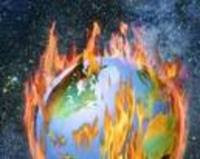This past weekend, the
Ohio Environmental Council hosted a 'game' of Stabilization Wedges. Contrary to what the title might have some of you thinking, this did not involve fraternity style pantsing or whirlies in public toilets. I was relieved. The Greek system was not kind to me in college. One sorority rejected me because of the way I styled my bangs (never mind I wasn't pledging or thinking of pledging) and there was a fraternity hazing incident where a plebe flashed me. (My eyes! My eyes!)
Anyway...luckily the topic tow truck showed up and is ready to haul me out of the off-topic ditch I landed in.
The Stabilization Wedges were developed by
Princeton's Carbon Mitigation Intiative and focuses on what we can do--in terms of known technology that is available today--to keep carbon emissions at current levels (detailed info at the link). The game comes into play when teams debate and select the most politically palatable combination of wedges to fight climate change. Think Model UN, but with climate.
Now, when I say 'we' I am not referring to the consumer level 'we' but the policy level 'we', which is actually one of the criticisms I have of the game. It gives a good sense of where the policy wonks and corporate interests are coming from, but it doesn't provide much of a takeaway for local or individual change/action.
Further, some of the 'wedges' are not long-term solutions and maybe not even medium-term solutions, meaning I found the game to be a bit short-sighted in terms of peak energy resources. It sounds great on paper to shift from dirty coal plants to cleaner natural gas plants for electricity generation, however,
natural gas reserves are estimated to be a 60 year supply, less if we accelerate use. Given that we need to build 1440 natural gas plants to make up one wedge, the return on investment is prohibitive. We'd likely hit peak almost the second the last plant came online. Not the greatest bang for the environmental buck if you ask me. Nuclear power (another emission reduction wedge) has similar constraints in that the
planet only has so much uranium available. So there are some limits that the game does not take into account (which I, personally, found problematic but they may not be an issue for other people).
In addition, one of the wedges seeks to reduce carbon emissions via natural carbon sinks (i.e. forests). Reforestation and land conservation sound like great ideas, but there is a downside. I happen to be reading the book Six Degrees which discusses the fact that stressed plants emit CO2 instead of absorbing it. During the 2003 heat wave, European forests emitted 1/12 of the world's total CO2 in just one short summer. With climate change, heat waves will be more common and more and more CO2 emissions will come from stressed vegetation. We can plant forests, but multiple and likely heat waves can easily make them a problem, not a solution.
Further, there is no wedge for the sum total impact of individual actions such as composting instead of throwing food waste into landfills, carpooling, improved community planning (i.e. new urbanism) etc... Maybe because it's hard to predict the impact. A power plant is a known quantity with proven math, whereas people are...well,
weird and defy the laws of statistics quite regularly (witness my little Greek flashback or the idea that pants belted around the knees with one's underwear hanging out = high fashion
in more than one person's opinion). However, I wish there was a wedge to show the cumulative effect of small actions as it would've provided important education and change incentive.
The big take home point for me was, forget inflation from printing money to deal with the financial crisis, energy prices are going to go through the ROOF on their own steam. The costs to build new plants and implement new technology such as carbon capture and sequestration will all be passed on to the consumer both in terms of our taxes and our energy costs. I suspect we will see a boom in home insulation and other energy renovations that cut heating and cooling costs. We will be doing anything and everything we can to NOT spend the equivalent of a very expensive car payment for heat and light.
Overall, I learned
a lot, met some wonderful people, and have a better perspective of where we are going with environmental policy. The nitpicks mentioned here are more indicative of thought provocation than any fatal flaws in the game.
The wedge game would make a good educational activity for schools and other groups (here's a
link to a teacher's guide). Although, I would like to adapt it a bit to address some of the issues I've noted here.
I believe the OEC plans to have
additional events on the topic of climate change and the policy thereof. If you have time, I encourage you to try and attend. I plan to!
